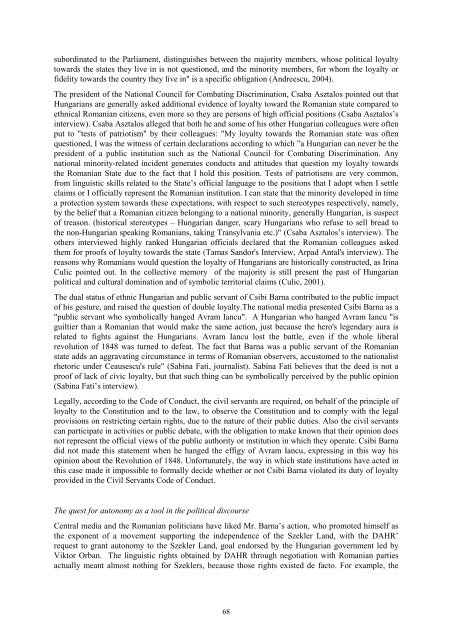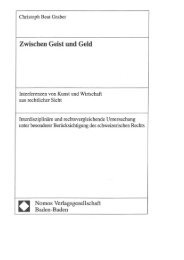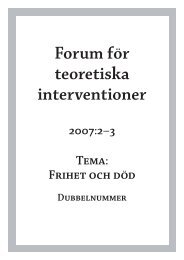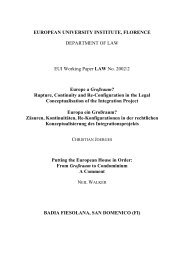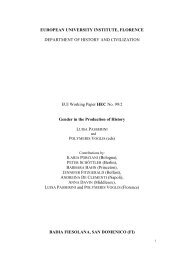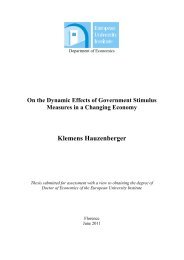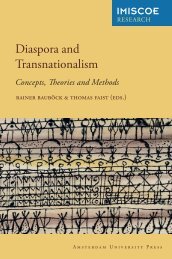Sinziana-Elena Poiana Ioana Lupea Irina-Madalina Doroftei Alina ...
Sinziana-Elena Poiana Ioana Lupea Irina-Madalina Doroftei Alina ...
Sinziana-Elena Poiana Ioana Lupea Irina-Madalina Doroftei Alina ...
You also want an ePaper? Increase the reach of your titles
YUMPU automatically turns print PDFs into web optimized ePapers that Google loves.
subordinated to the Parliament, distinguishes between the majority members, whose political loyalty<br />
towards the states they live in is not questioned, and the minority members, for whom the loyalty or<br />
fidelity towards the country they live in" is a specific obligation (Andreescu, 2004).<br />
The president of the National Council for Combating Discrimination, Csaba Asztalos pointed out that<br />
Hungarians are generally asked additional evidence of loyalty toward the Romanian state compared to<br />
ethnical Romanian citizens, even more so they are persons of high official positions (Csaba Asztalos’s<br />
interview). Csaba Asztalos alleged that both he and some of his other Hungarian colleagues were often<br />
put to "tests of patriotism" by their colleagues: "My loyalty towards the Romanian state was often<br />
questioned, I was the witness of certain declarations according to which ”a Hungarian can never be the<br />
president of a public institution such as the National Council for Combating Discrimination. Any<br />
national minority-related incident generates conducts and attitudes that question my loyalty towards<br />
the Romanian State due to the fact that I hold this position. Tests of patriotisms are very common,<br />
from linguistic skills related to the State’s official language to the positions that I adopt when I settle<br />
claims or I officially represent the Romanian institution. I can state that the minority developed in time<br />
a protection system towards these expectations, with respect to such stereotypes respectively, namely,<br />
by the belief that a Romanian citizen belonging to a national minority, generally Hungarian, is suspect<br />
of treason. (historical stereotypes – Hungarian danger, scary Hungarians who refuse to sell bread to<br />
the non-Hungarian speaking Romanians, taking Transylvania etc.)" (Csaba Asztalos’s interview). The<br />
others interviewed highly ranked Hungarian officials declared that the Romanian colleagues asked<br />
them for proofs of loyalty towards the state (Tamas Sandor's Interview, Arpad Antal's interview). The<br />
reasons why Romanians would question the loyalty of Hungarians are historically constructed, as <strong>Irina</strong><br />
Culic pointed out. In the collective memory of the majority is still present the past of Hungarian<br />
political and cultural domination and of symbolic territorial claims (Culic, 2001).<br />
The dual status of ethnic Hungarian and public servant of Csibi Barna contributed to the public impact<br />
of his gesture, and raised the question of double loyalty.The national media presented Csibi Barna as a<br />
"public servant who symbolically hanged Avram Iancu". A Hungarian who hanged Avram Iancu "is<br />
guiltier than a Romanian that would make the same action, just because the hero's legendary aura is<br />
related to fights against the Hungarians. Avram Iancu lost the battle, even if the whole liberal<br />
revolution of 1848 was turned to defeat. The fact that Barna was a public servant of the Romanian<br />
state adds an aggravating circumstance in terms of Romanian observers, accustomed to the nationalist<br />
rhetoric under Ceausescu's rule" (Sabina Fati, journalist). Sabina Fati believes that the deed is not a<br />
proof of lack of civic loyalty, but that such thing can be symbolically perceived by the public opinion<br />
(Sabina Fati’s interview).<br />
Legally, according to the Code of Conduct, the civil servants are required, on behalf of the principle of<br />
loyalty to the Constitution and to the law, to observe the Constitution and to comply with the legal<br />
provisions on restricting certain rights, due to the nature of their public duties. Also the civil servants<br />
can participate in activities or public debate, with the obligation to make known that their opinion does<br />
not represent the official views of the public authority or institution in which they operate. Csibi Barna<br />
did not made this statement when he hanged the effigy of Avram Iancu, expressing in this way his<br />
opinion about the Revolution of 1848. Unfortunately, the way in which state institutions have acted in<br />
this case made it impossible to formally decide whether or not Csibi Barna violated its duty of loyalty<br />
provided in the Civil Servants Code of Conduct.<br />
The quest for autonomy as a tool in the political discourse<br />
Central media and the Romanian politicians have liked Mr. Barna’s action, who promoted himself as<br />
the exponent of a movement supporting the independence of the Szekler Land, with the DAHR’<br />
request to grant autonomy to the Szekler Land, goal endorsed by the Hungarian government led by<br />
Viktor Orban. The linguistic rights obtained by DAHR through negotiation with Romanian parties<br />
actually meant almost nothing for Szeklers, because those rights existed de facto. For example, the<br />
68


